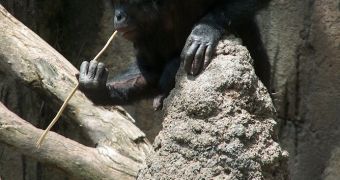Bonobos are very peculiar animals. In addition to their bizarre mating rituals, they also tend to share things. But that would in itself be nothing of significant importance, had researchers not discovered that there is basically nothing you can do to stop the primates from doing so. While human kindergarten teachers struggle to implement the values of sharing and cooperation in our youngsters, bonobos have this ability built in, so deep that they cannot seem to be able to shake it. Details of the recent investigation appear in the latest issue of the respected scientific journal Current Biology.
When compared to these primates, chimpanzees, and even humans, fall very short. While our species tends to get past its natural impulses to hoard stuff through long years of education, chimps never really learn to do it. In fact, they are notorious for keeping as much food to themselves as possible, sometimes protecting it from others via physical violence. The only times when chimps share is when they produce offspring, but they quickly grow out of it. According to experts at the Duke and Harvard universities, the differences that occur between bonobos and chimps may be rooted in developmental patterns.
This means that the behaviors could be used to discover more data on the historical lifestyles of these two closely related ape species. Bonobos live in “a sort of Peter Pan world. They never grow up, and they share,” Duke Assistant Professor of Evolutionary Anthropology Brian Hare explains. He has been involved in both Current Biology papers. Hare and Richard Wrangham, the Harvard Ruth Moore professor of anthropology, believe that one of the main reasons why bonobos developed this type of cooperative behavior was the fact that their environments were plentiful, which entailed less competition.
Additionally, these primates do not have to fight gorillas for access to food, as chimps do, which may also be a contributing factor to this. It was also discovered that bonobos didn't really get past their childhood-style behaviors, even after they went well into adulthood. “It seems like some of these adult differences might actually derive from developmental differences. Evolution has been acting on the development of their cognition,” Victoria Wobber, a Harvard graduate student, says. She has been the lead author of one of the journal entries.

 14 DAY TRIAL //
14 DAY TRIAL //